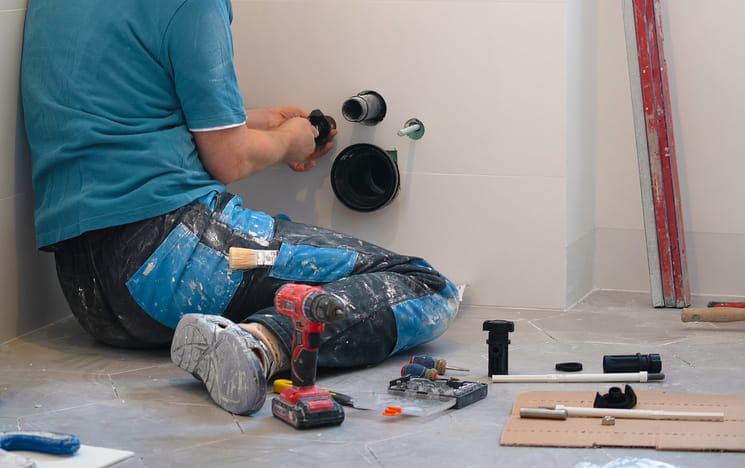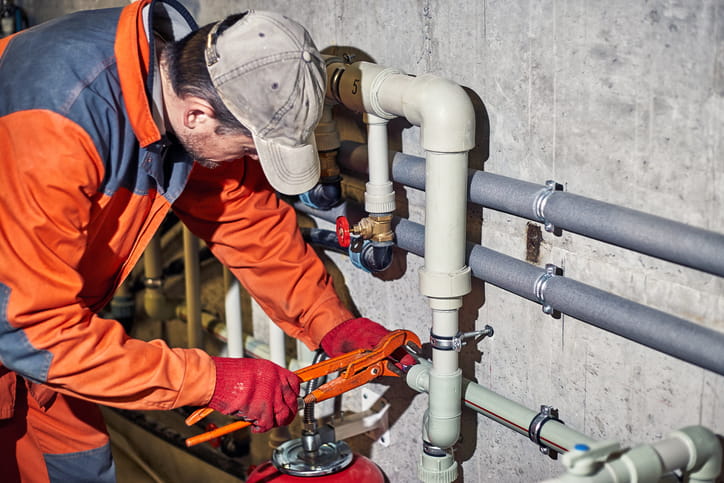Plumbing work can be a daunting task if you don’t have the right tools. From the messy process of snaking drains to the delicate job of replacing a faucet, having the right power tools makes all the difference.
Plumbers need specialized tools to ensure that they can get the job done effectively and efficiently. These tools help to simplify the plumbing process, making it easier to diagnose and repair any plumbing issues safely and quickly. What supplies come first on their plumbing power tools list? In this article, we’ll take a look at the four must-have power tools a plumber uses.
Contact Larkin Plumbing Service today for all your plumbing needs.
The four most common plumbing tools
If you have plumbing work, here are tools a plumber uses to get the job done:
1. Power drill
A power drill is a handheld tool used by plumbers to drill holes in different surfaces — such as walls, floors, and ceilings — while installing pipes, fixtures, and fittings. A drill bit is attached to the end of the drill, allowing the user to bore holes through hard materials such as concrete, metal, or wood with ease.
Here are the critical factors that plumbers consider when choosing a power drill for plumbing tasks:
- Power: The drill’s power determines its ability to bore through tough materials such as concrete, metal, or wood.
- Speed: Adjustable speed settings allow for optimal performance on different materials and surfaces.
- Torque: Proper torque settings ensure that the drill can handle the twisting force required to drill through hard materials effectively.
- Chuck size: The chuck is the part of the drill that holds the drill bit, and the size of the chuck will determine the size of the bit that can be used. Plumbers consider this when choosing a drill suitable for different tasks.
Power drills come in many shapes and sizes, with corded and cordless options available.
Corded drills are typically more powerful than cordless, but cordless drills provide greater flexibility and mobility. This mobility is ideal for plumbers working on job sites where there is no access to electricity or where extension cords are impractical.
A power drill is a vital tool for any plumbing professional, enabling them to drill exact holes in different surfaces with ease and precision. The flexibility, efficiency, and accuracy provided by the drill make the work quicker, easier, and ultimately more effective, delivering higher-quality results.
2. Electric pipe cutter
An electric pipe cutter is one of the best tools for plumbers for cutting pipes quickly and easily. It can be powered by electricity or lithium batteries and allows plumbers to make clean and accurate cuts for pipes of varying sizes.
With this tool, plumbers can easily slice through pipes made of different materials such as PVC, copper, PEX, and steel.
One of the significant benefits of an electric pipe cutter is that it is much faster and more efficient than manual pipe cutters or hacksaws, which require manual effort and can be time-consuming. The tool eliminates the need for physical effort, which allows plumbers to save time and increase productivity.
When choosing an electric pipe cutter, plumbers consider factors such as the diameter of the pipe to be cut, the thickness of the material to be cut, and the cutting blade’s capacity.
The motor power, speed, and blade capacity also play a crucial role in determining the cutting performance of the tool.
3. Power auger
When it comes to clearing blockages in drains and pipes, a power auger is the tool to use.
This is an electric-powered tool that uses a long, flexible cable with a cutting head to break up blockages in the piping.
The cutting head on the cable spins around to break up and push the blockage through, and you can also pull the blockage back out. It’s an essential tool for plumbers and guarantees quick and efficient clearing of blockages.
Power augers are essential on a plumber’s equipment list for the following reasons:
- They are fast and efficient at clearing blockages in drains and pipes
- The spinning cutting head on the cable can break up even the hardest of blockages, such as tree roots
- They enable plumbers to reach into long drain pipes without having to dismantle them first
- They are less labor-intensive than manual augers, making them more efficient
With a power auger, plumbers can quickly and efficiently clear blocked drains and pipes.
This tool is a must-have for any experienced plumber or handy homeowner, as it enables them to get the job done faster and with less effort than manual augers.
4. Reciprocating saw
Sometimes it is necessary to cut through wood, plaster, and other materials that may be blocking access to pipes and other plumbing components. A reciprocating saw is the perfect tool for these situations.
Here’s a list of situations where you may need a reciprocating saw:
- Cutting through various materials such as wood, metal, or plastic
- Removing nails or screws that are embedded
- Creating openings in walls, ceilings, or floors for plumbing access
- Cutting pipes, especially in hard-to-reach areas
- Reshaping pipes during repairs or installations
- Demolishing drywall or other materials that require removal
- Cutting roots or invasive plants in outside drainage systems
This power tool can quickly and efficiently cut into walls, floors, and ceilings, making it easier to get access to any plumbing equipment that requires servicing. It’s a great tool to have in your plumber’s toolbox.
Four plumber tools and equipment recommendations
Having the right plumber tools is crucial to success in any plumbing project. From pipe wrenches to basin wrenches and power augers to reciprocating saws, every plumber needs an arsenal of tools to get the job done. If you’re looking to get started with plumbing work or simply upgrade your plumber’s equipment list, these tools are an excellent place to start. Now that you know the tool names and are familiar with a few of the tools used by a plumber, you can start tackling those home improvement projects.
Plumbing work can be complex and challenging, so it’s always a good idea to hire a professional plumber with the necessary tools and expertise to get the job done.


